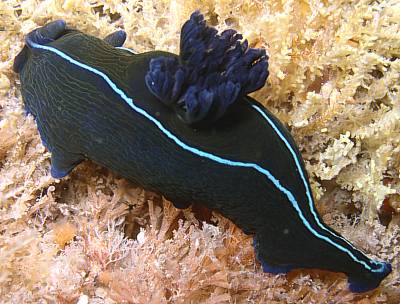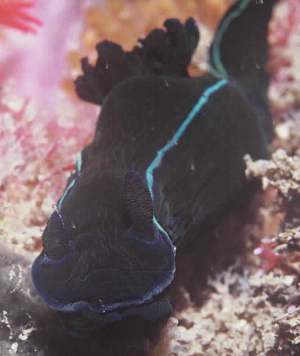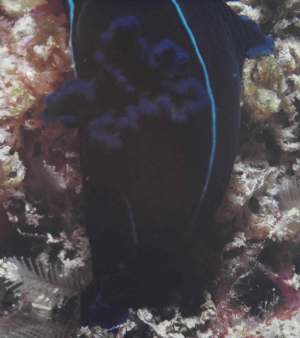
Tambja capensis
(Bergh, 1907)
Order: NUDIBRANCHIA
Suborder: DORIDINA
Superfamily: ANADORIDOIDEA
Family: Polyceridae
Subfamily: Nembrothinae
DISTRIBUTION
Temperate waters of South Africa.
PHOTO
Port Elizabeth, South Africa. Depth 10 meters. Photo: Charels Rowe
Uniformly black with a blue-green margin to the mantle. Described as Nembrotha but moved to Tambja on account of its radular morphology (Gosliner, 1987). Feeds on arborescent bryozoans and found from intertidal to 30m.
Reference:
•Gosliner, T,M. (1987) Nudibranchs of Southern Africa
Rudman, W.B., 2000 (July 9) Tambja capensis (Bergh, 1907). [In] Sea Slug Forum. Australian Museum, Sydney. Available from http://www.seaslugforum.net/find/tambcape
Related messages
Re: Tambja capensis from South Africa
October 2, 2003
From: Charles Rowe
Bill,
Re your question: The photos were taken last week on 24 September 2003. 'Avalanche' is a spot I might dive once every 2 to 3 months but next time I do spot Tambja capensis I will take more photos of them and hopefully their food and if I am very lucky them laying eggs.
Charles
bumff@mweb.co.za
Rowe, C., 2003 (Oct 2) Re: Tambja capensis from South Africa. [Message in] Sea Slug Forum. Australian Museum, Sydney. Available from http://www.seaslugforum.net/find/11077Thanks Charles,
Bill Rudman
Tambja capensis from South Africa
September 30, 2003
From: Charles Rowe


Now I have started the ball rolling with Chromodoris heatherae I have another nudi from Port Elizabeth [South Africa] to identify. This one was seen at 20 metres at a site called Avalanche which is a very good dive site. I spotted about 6-8 specimens and took about 4 photos and the best is shown below. I am unable to see it in the only book I have, Nudibranchs and Sea Snails by Helmut Hebelius and that is why I am contacting you. The shot of the eggs was taken near to the black nudis but I am not sure if they actually belong to them.
Charles Rowe
bumff@mweb.co.za
Rowe, C., 2003 (Sep 30) Tambja capensis from South Africa. [Message in] Sea Slug Forum. Australian Museum, Sydney. Available from http://www.seaslugforum.net/find/11067
Dear Charles,
This is Tambja capensis. According to Terry Gosliner, who by chance visited Sydney for a few hours on Sunday, this species is found only in the temperate waters of the Cape Province. It feeds on arborescent bryozoans and I suspect the plant-like growth in the close-up photo alongside is its food.
I am happy to receive photos of opisthobranchs from South Africa as there are many gaps in our knowledge of the fauna of southern Africa. Even photos of animals you have identified are welcome as they help to give us a fuller picture of colour variation and distribution, and if you are lucky enough to photograph animals on their possible food organisms, or laying eggs, this can be a useful addition to the scant knowledge we have on their biology.
Concerning the egg ribbon photo. As you suspect, it is very difficult to be sure of the identify of egg ribbons unless your actually see them being deposited. I have left your photo in the message but the only way of knowing if it belongs to Tambja capensis is to regularly visit the Tambja population until you are lucky enough to find one laying. Terry says it is quite a common subtidal species. If you do find it laying a ribbon, it will be a valuable bit of information, as we don't know much about the egg ribbons of any species of Tambja. Can you give me a date for the photos please?
Best wishes
Bill Rudman
Tambja capensis from South Africa
August 22, 2003
From: Rudolph van Jaarsveld


Hi Bill,
Some photos of Tambja capensis from Port Elizabeth, South Africa. I found 5 of the animals in a small area of about a square meter. I did not see any other during the rest of the dive. Depth 13 meters, water temp 14 deg. Celsius.
Regards,
Rudolph.
rudolph.vanjaarsveld@tcm.co.za
van Jaarsveld, R., 2003 (Aug 22) Tambja capensis from South Africa. [Message in] Sea Slug Forum. Australian Museum, Sydney. Available from http://www.seaslugforum.net/find/10722Thanks Rudolph,
Species of Tambja feed on arborescent [plant-like] colonies of bryozoans, so when you find them clustered together it usually indicates that they are feeding, or that their food is nearby. It may be worth looking at any other photos you took of them to see if they are on, or near a plant-like bryozoan colony
Best wishes
Bill Rudman
Tambja capensis from South Africa
July 17, 2000
From: Valda Fraser

Dear Bill
Just for you ... Tambja capensis, or so I think.
Locality: Brazen Head, Transkei, SOUTH AFRICA - 28m
Date: June 2000
Size: 45mm
Regards,
Valda Fraser
iti04937@mweb.co.za
Dear Valda,
Your new dive spots in the Transkei seem to be taking you into a more temperate fauna.
Are the light specks in the photo part of the animal's colour pattern or are they sediment in the water?
Best wishes,
Bill Rudman.
